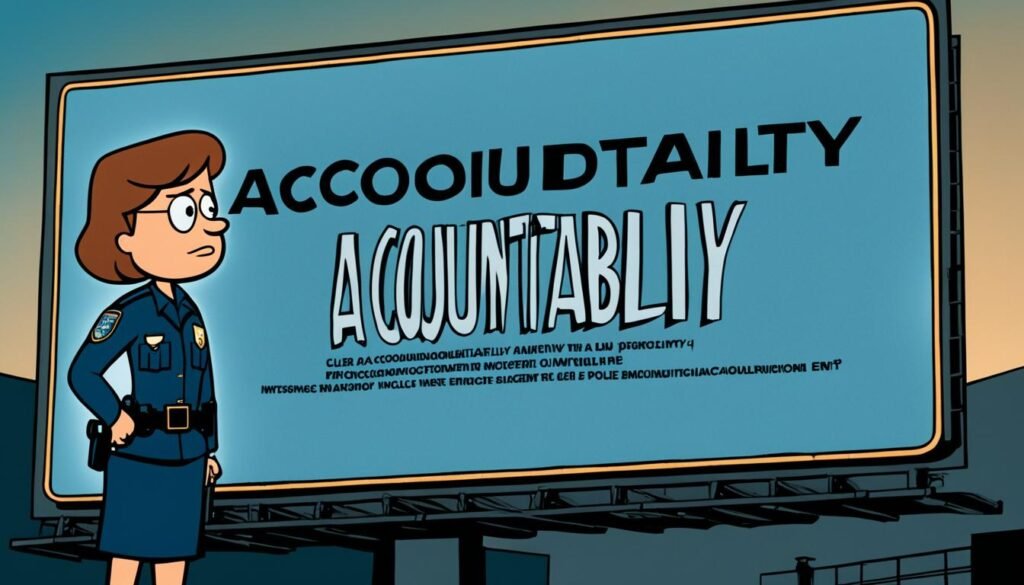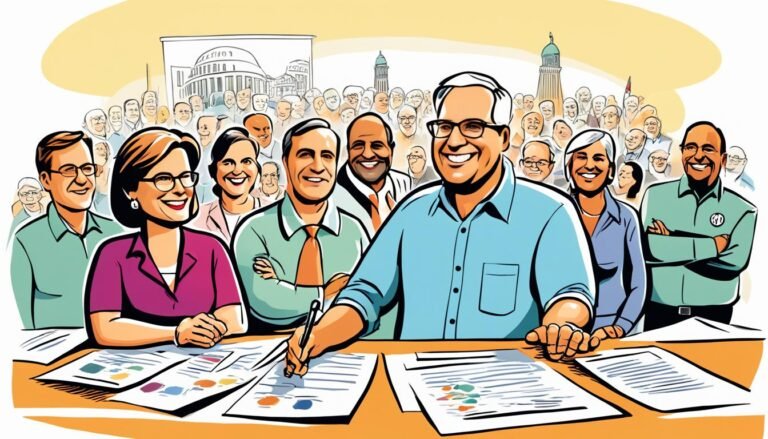Leadership in Law Enforcement: Ensuring Safety
“Effective leadership is not about being in charge. It is about taking care of those in your charge.” – Simon Sinek
Leading in the police means making sure everyone is safe. It’s not just about giving orders. It’s about protecting those around you. This article looks at how leaders in law enforcement keep our neighborhoods secure.
Good police leaders focus on safety plans and building strong relationships. They think about how to tackle the tough parts of their job. We’ll see what makes a great police leader and how they keep us safe.
Key Takeaways:
- Effective leadership in law enforcement plays a crucial role in maintaining community safety.
- Leadership strategies should prioritize both the safety of the public and the well-being of police officers.
- Building trust, implementing safety protocols, and fostering open communication are vital elements of successful police leadership.
- Emphasizing professional development and ethics enhances the effectiveness and accountability of law enforcement leaders.
- By investing in leadership development programs, police agencies can ensure a pipeline of skilled leaders for the future.
Visionary Leadership and Strategic Planning
Good police leaders know how vital it is to have a clear vision and a smart plan. This helps them meet their goals and keep the public safe.
They share a strong vision for the future of their teams. This vision boosts their team’s spirits and gets the whole community involved. They show how important it is to work ahead and to connect closely with people.
Strategic planning guides police leaders as they face changing times. They look at trends, spot new challenges, and find new ways to keep people safe. With a good plan, they make smart choices and use resources well. This way, they ensure good results for their teams and the communities they protect.
Using new crime-solving methods is a great example of smart leadership and planning. Leaders use new tech and methods to stop crimes before they happen. This helps them keep up with wrongdoers and keep their areas safe.
Leaders also make sure to team up with the community. They start programs and work with local groups to build trust. By doing so, they create a friendlier environment and get locals involved in stopping crime.
Innovation in Policing
Being open to new ideas and technologies sets leaders apart in law enforcement. They welcome new tech and smart ways to use data. This helps them beat new challenges and meet the community’s needs well.
Predictive policing is one smart way they do this. It uses high-tech analysis to find where crimes might happen. This lets police put their teams in the best places to stop crime and ease community worries before they grow.
Building strong ties between police and the community is key too. This community-focused approach works together with locals to find the real reasons behind crime. It helps to fix these issues for good and builds community trust.
| Benefits of Visionary Leadership and Strategic Planning | Examples |
|---|---|
| Enhanced public safety through proactive law enforcement | Implementing community policing initiatives that focus on prevention |
| Building trusting relationships between law enforcement and the community | Engaging in regular community outreach programs and town hall meetings |
| Development and implementation of innovative policing strategies | Utilizing data analytics and technology to optimize resource allocation |
| Effective allocation of resources based on community needs | Using strategic planning to allocate personnel and equipment efficiently |
Having a strong vision and an effective plan are crucial for police leaders. They help bring about good change, improve the way the police work, and make communities safer. By using new ideas and sharing their vision well, leaders ensure the safety and happiness of everyone.
Effective Communication and Relationship Building
For police leaders, strong communication is key to success. It helps them create open and clear communication paths within their teams. This ensures that important news moves efficiently.
Leaders listen to what officers, the public, and others say. They listen carefully, showing they understand and care. This builds trust and gets people to work together better. Listening like this makes everyone feel included and boosts teamwork within the force.
Trust is born from open and honest sharing. Leaders make sure that everyone knows the important stuff. Doing this builds a culture of trust and responsibility. Open lines of communication mean everyone gets the info they need. This makes solving problems and reaching goals easier.
“Effective communication is not only limited to internal interactions, but it also extends to the community at large.”
Police leadership is also about connecting with the community. They do this through events and by working with local groups. This helps build bridges between the police and the people they serve.
Through these events, local people get a direct say in what happens in their area. This gives them a sense of control and shared duty. It also lets officers meet them when not dealing with emergencies, which in turn creates trust and understanding.
“Community outreach programs serve as a powerful tool for proactive policing and community engagement, allowing leaders to establish meaningful connections and address community concerns.”
Good communication and creating strong relationships are the bedrock of police leadership. When leaders focus on these, they build trust, teamwork, and unity. Thus, they become better at facing tough challenges and keeping the community safe.
Emphasis on Professional Development
Police leaders must focus on professional development to grow personally and help their team. Learning continues opens eyes to new best practices and tech. This keeps you ahead in the field of policing.
Supporting your and your officers’ growth builds a strong team spirit. Giving them chances to attend workshops, conferences, and get certifications helps them learn more. This builds their confidence and skills.
Developing skills helps your officers do better in their jobs and makes your agency thrive. It keeps you aware of new methods so you can lead with fresh, effective ways. This drives change for the better.
Showing you always want to learn sets a great example for your team. Investing in professional growth tells them it’s important to keep getting better. This inspires a culture of constant learning.
“Continuous learning and professional development are essential for police leaders to adapt to the ever-evolving landscape of law enforcement.” – John Adams, Police Chief
Training Opportunities
Training is vital for professional growth. It comes in many shapes:
- On-site workshops and seminars
- Online courses and webinars
- Partnerships with local colleges and universities
- Specialized training programs
Make sure the training fits the jobs and challenges in your agency. This way, your team learns the most useful things.
Specialized Certifications
Getting special certifications in things like crime prevention or leadership makes your team more skilled and trusted. These certifications show they’re serious about growing professionally.
Encouraging your officers to get these certifications is a way to support their careers. It also gives them solid proof of their dedication.
Such certifications not only make individuals more confident but also make your agency stronger. They set a high bar for everyone’s skill development in your organization.
| Certification | Benefits |
|---|---|
| Crime Prevention Specialist | Enhanced knowledge of crime prevention strategies |
| Community Policing Practitioner | Improved skills in building trust and partnerships with the community |
| Leadership in Law Enforcement | Developed leadership skills and strategies |
Ethical Leadership and Accountability
Ethical leaders in the police are key to success. They lead by example, showing integrity, fairness, and respect. This builds trust and confidence in their teams and the community.
Being clear and honest is crucial for ethical leadership. Leaders make sure their decisions are open and in line with the organization’s values. This creates trust and makes team members feel responsible.
“Transparency is the foundation of a strong, effective police force. Leaders show they have nothing to hide. They work hard to address concerns and problems openly and quickly.”
– Chief Ava Morales, San Francisco Police Department
In ethical leadership, being accountable is also very important. Leaders check that their team members follow the rules. They act quickly, fairly, and openly against any wrong behavior.
Dealing with bad behavior is part of good leadership. Leaders look into complaints closely. They make sure the right actions are taken. This way, they show they care about fairness and everyone’s well-being.
Case Study: Promoting Ethical Leadership
Police Chief Jessica Ramos in Seattle took on ethical leadership challenges. She wanted to make sure her department was honest and accountable. So, she made some changes.
Chief Ramos set up a way for officers to report wrongdoings safely. She promised they could speak up without fear. Also, she started a board to check into misconduct claims without bias.
Thanks to Chief Ramos’s actions, her department got better. Everyone was more open about the mistakes and they fixed them. This brought the police and the community closer. It made the area safer and the relationships stronger.

Putting ethics and responsibility first makes police forces better. It builds a culture of honesty, openness, and doing the right thing. This way, the whole community and people see the police in a better light.
Successful Police Leadership in Action
Great police leadership can greatly improve a city’s safety. It also changes how people see the police. Leaders who are hands-on, work with the community, and aim to build trust get strong results.
Imagine a police chief who made a whole city safer by involving everyone. This isn’t just about solving crimes. It’s about stopping them before they happen. This means working together to fix the issues at the heart of crime.
“Our goal is not just to fight crime, but to prevent it from happening in the first place. We believe in taking a collaborative approach, working hand in hand with community members to address the underlying issues that contribute to crime.”
Chief Maria Hernandez led Riverdale Police with new, smart plans to lower crime. She worked closely with community leaders. They tackled the reasons behind crime together and focused on building trust.
Chief Hernandez started many community programs. They were all about making the police and the people closer. These programs included:
- Regular town hall meetings to encourage open dialogue between police officers and community members
- Community policing units that worked closely with residents to identify and address local crime concerns
- Collaborations with local schools to implement anti-drug and anti-gang programs
By listening and talking to the community, Chief Hernandez made sure they felt valued. This approach boosted trust and made people keen to help stop crimes.
Impact and Results
Chief Hernandez’s work brought big changes to Riverdale. Thanks to efforts from both the police and the community, crime dropped by a lot. The good things they did led to:
- A 20% reduction in overall crime rates
- A 30% decrease in drug-related offenses
- A 40% drop in gang-related incidents
These numbers show how strong police leadership can be. With the right plan and support from the community, they can do a lot of good.
Leadership Accountability
It is key to hold police leaders responsible for their actions. Doing so helps keep the trust between police and the communities they protect. This is done through internal affairs systems, external checks, and by being open about what happens.
Inside police forces, there are systems in place to check on behavior. They make sure to look into any complaints or issues about how officers act. This ensures a fair look into each case, encouraging good and fair behavior.
Then, there are outside groups that also watch over the police. These might be community boards, independent reviewers, or special offices. Their job is to keep an eye on the police to see if they follow the right laws and standards.
Being honest and open is crucial in leadership accountability. It helps the police and the public trust each other more. By sharing information clearly, everyone can see the police are doing their best to meet high standards.
To sum up, making leaders answer for their actions needs strong inside checks, outside watchers, and a promise to be open. These steps help keep the police acting fairly and build trust with the people they serve.
| Accountability Measures | Description |
|---|---|
| Internal Affairs Systems | Internal mechanisms within law enforcement agencies responsible for investigating complaints and allegations of misconduct against police personnel. |
| External Oversight Mechanisms | Independent bodies or individuals responsible for monitoring and reviewing police conduct, policies, and practices to ensure compliance with legal and ethical standards. |
| Transparency | Openness in communication channels and disclosure of relevant information to build trust and demonstrate the commitment to upholding standards. |
Using these checks helps police forces ensure their leaders act responsibly. This, in turn, helps the public trust and feel confident in the police.
Community Engagement and Trust-Building
Successful police leaders know how vital it is to have strong ties with the public they protect. They use community policing and outreach programs to connect with people. By dealing with the root issues of crime, trust grows, making our neighborhoods safer.
Getting communities involved is key to good policing. Leaders get locals to help prevent crime and solve problems. This teamwork makes policing more effective and addresses community concerns directly.
“Community-oriented policing is about teamwork, facing our local challenges together. Listening to the community, hearing their voices, and letting them take part in decisions helps build trust and a safer community for all.”
Being proactive in reaching out to the community is also crucial. Officers go to local events and get to know people. By building these connections, they break down walls between the police and the public, creating trust.
Strategies for Community Engagement and Trust-Building
Police leaders have many ways to work with the community and earn trust. Some of these strategies include:
- Having regular town hall meetings to promote communication between the police and the public.
- Assigning officers to work in specific neighborhoods, so they get to know the people and address issues directly.
- Teaming up with local groups, schools, and places of worship to fight crime together and strengthen the community.
- Offering education to the public so they can protect themselves and their neighborhoods better.
- Backing up local efforts, like watch groups and youth programs, that make communities safer.
These strategies show leaders are dedicated to working closely with the public for everyone’s safety. This work stops crime and makes life better for everyone in the neighborhood.
Example of Community Engagement in Action
Chief Maria Rodriguez of the ABC Police Department changed how locals saw their police with a new plan. She started initiatives to listen to and deal with community worries:
- She created a Citizen Advisory Board to take ideas from the public on how to make policing better.
- She hosted community meetings to talk about problems and share updates on local crime.
- She formed a police unit that works only in communities, getting to know locals and helping at events.
- She partnered with schools to make students and police friends, so they trust each other more.
- She worked with local groups to help young people stay away from crime, offering them positive choices.
Thanks to Chief Rodriguez’s work, there was less crime, and people felt safer. Her approach is a success story for building trust and making communities better with the help of the whole community.
Leadership Development Programs
Leadership programs are key for police to handle complex law problems. They train leaders and help them grow professionally. This is crucial for good police leadership.
Leaders need various skills like ethics, conflict solving, and good communication. These crucial abilities are taught through leadership programs. They equip leaders to lead effectively and wisely.
Ongoing learning is vital for leaders at any career stage. These programs offer workshops and certifications. They help leaders keep improving and meet new law enforcement challenges.
Investing in leadership development enhances the effectiveness of police leaders and ensures a pipeline of future leaders.
These programs also focus on being ethical and accountable. Ethical leadership builds trust in the community. Ethics are a central part of these leadership programs.
By joining these programs, police leaders get better at their jobs. They learn skills to face changes in law enforcement. Both individual leaders and their teams benefit from these programs.
Benefits of Leadership Development Programs:
- Enhanced leadership skills
- Increased ethical awareness and accountability
- Improved decision-making and problem-solving abilities
- Effective conflict resolution and communication skills
- Expanded professional network and mentorship opportunities
Investing in these programs is vital for police leaders’ growth. It also supports law enforcement’s ability to serve with integrity.
| Benefits of Leadership Development Programs | |
|---|---|
| Enhanced leadership skills | |
| Increased ethical awareness and accountability | |
| Improved decision-making and problem-solving abilities | |
| Effective conflict resolution and communication skills | |
| Expanded professional network and mentorship opportunities |
Conclusion
Good leadership in law enforcement is key. It ensures both cops and the people they serve stay safe. Leaders do this by making safety a top priority, looking after their officers, and starting safety programs in the community.
Strong, forward-thinking leaders in the police can make their teams better. They do this by valuing learning and being honest. This helps the whole group get better and ensures they lead in following good policing.
Being a leader in law enforcement is more than just making tough calls and following rules. It’s about connecting deeply with people, looking out for the police, and keeping everyone’s trust. This happens when leaders focus on getting better, clear communication, and always doing what’s right. This way, the police can make our world a safer place for everyone.
FAQ
What is the role of police leaders in ensuring safety?
Police leaders are key to keeping law and order safe. They help make sure communities are safe and people trust the police.
What are some key skills and qualities of effective police leadership?
Good leaders in the police have a vision and make plans. They focus on stopping problems before they start. They also work closely with the community and encourage new ideas.
How important is communication in police leadership?
Talking well is vital for leading the police. Good leaders make sure everyone talks openly. They also really hear what others are saying. They reach out to the community too.
Why is professional development important for police leaders?
Learning all the time is a must for police bosses. It helps them stay up to date. They learn new ways to do their job, which helps their teams grow too.
What is the role of ethical leadership in law enforcement?
Doing the right thing is the foundation of police leadership. Good leaders show others how to be fair. They are open and make sure wrong actions are corrected fast.
Can you provide an example of successful police leadership in action?
Sure. A police chief took a new path, focusing on the community’s needs. By working with local leaders and by openly talking to the community, crime went down. More people got involved in making their areas safe.
What is the importance of leadership accountability in law enforcement?
Being accountable is key for leaders to keep trust. When they and their teams are watched fairly, people can rely on the police more. This means following strict rules and being open about mistakes.
How can police leaders engage with communities and build trust?
They can get to know community members and get involved in solving deep problems. This means working with the community in a friendly and helpful way. They are active in reaching out to the people they serve.
Why are leadership development programs important for law enforcement?
These programs improve bosses and future leaders. They offer knowledge, growth chances, and focus on doing the job right. This makes the police leader’s teams do better and the community put more trust in them.
What is the overall importance of effective leadership in law enforcement?
Leading well is crucial for keeping everyone safe and happy. It makes the police trusted and encourages good changes in how they work.
Source Links
- https://www.police1.com/chiefs-sheriffs/articles/leadership-development-series-understanding-why-police-leaders-succeed-Tu4CK80YMLGeTpCX/
- https://intime.com/industries/police/strategies-for-effective-leadership-in-law-enforcement/
- https://www.apu.apus.edu/area-of-study/security-and-global-studies/resources/the-most-effective-leadership-styles-in-law-enforcement/








